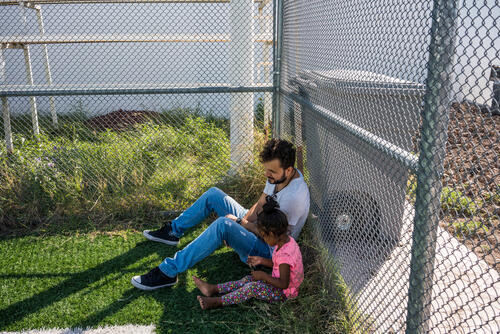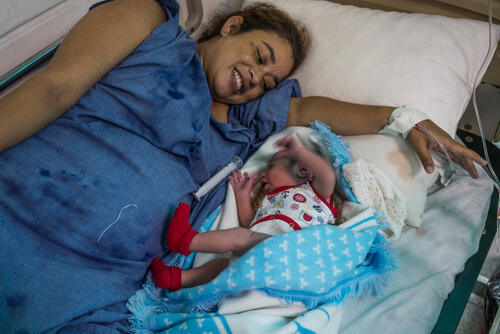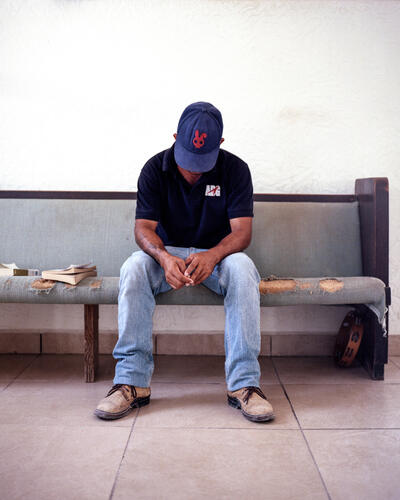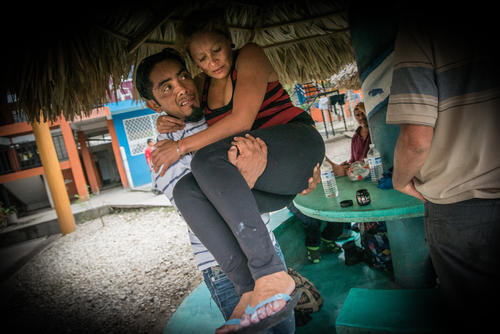This extract from Desperate journey: Fleeing invisible wars in Central America, published by MSF's US office, recounts the experiences of patients treated by MSF teams in Reynosa, a common rest stop for many Central American migrants hoping to gain entry to the US, and one of the most violent cities in Mexico.
It’s nearing 100 degrees Fahrenheit [38 degrees Celsius] under a cloudless mid-July sky when the MSF mobile clinic team arrives at the Senda de Vida migrant shelter on the bank of the Rio Grande.
Founded in 2000, this Christian shelter has grown from a single house to a modest compound, and more housing is under construction.
With little national funding available to aid people on the move, and absent an international response commensurate with the scale of the displacement crisis in Central America, Christian groups and small, local non-profits have stepped in to fill the wide gaps in services.
MSF teams have been providing mental, social, and physical health consultations to the migrants sheltering here for around a year and a half.
Thirty-two-year-old Piedad waits in the blistering heat in the complex’s concrete courtyard with her three-year-old daughter, Dayli. The girl has been suffering from an ear infection, so Piedad has brought her to see one of the MSF doctors.
Her three sons—15-year-old Josue, eight-year-old Eddy, and seven-year-old Jairo—kick a soccer ball back and forth in the shade of one of the shelter buildings.
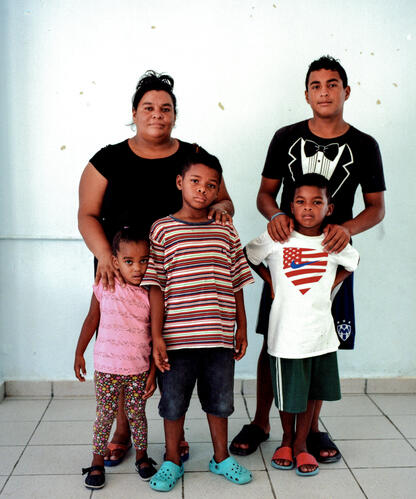
We can’t live in Honduras. I’d like us to have a home of our own, but it was necessary to leave there. They threatened my children.Carlos
“I used to run a bakery in Triunfo de la Cruz, Honduras,” says Piedad. “But we were told by the maras that we had to pay the ‘war tax.’ We couldn’t afford to pay anymore—we only sold bread. My son, Josue, was threatened. We were told that if we couldn’t pay we would be killed.”
Piedad, her husband, and their children felt they had no choice but to flee their home, which they did on 15 April. They set off on foot for the Guatemalan border in hopes of reaching safety in the US.
Eventually they caught a bus to Tenosique, Mexico, where they were assaulted and robbed of their identification documents. They found shelter at La 72.
“We saw MSF in the migrant shelter in Tenosique,” says Piedad. “They gave us counselling and medicine for my children, and medical care and advice.” From there they continued on the path north, walking and catching buses where they could.
“In some cities we had to beg for money to buy bus tickets or food,” she says. “We slept in the hills or on the outskirts of towns. There were days when we didn’t eat or drink any water.” They stopped in Coatzacoalcos, where they again received care from an MSF team.
Finally, they reached Reynosa, where they sought out Senda de Vida, which they had learned about on their journey. They had also heard that they might have better luck crossing the border if they travelled separately, with Piedad accompanying her sons and her husband accompanying Dayli.
So, Piedad set off with the boys, heading for the bridge over the river while her husband and daughter remained at Senda de Vida.
“It was a terrible experience,” she remembers. “We first met with US immigration and asked for refugee status. But we were denied, and they told us to wait. We stood in the sun for four hours. Finally, Mexican immigration agents came and asked if they could take us. The Americans said yes.”
Without the papers that had been stolen in Tenosique, Piedad could not prove who she was or where she’d come from. She and her two younger sons were brought back to Reynosa and held in a jail cell. Josue, her eldest son, was held separately in a detention centre for minors. She had no idea where he had been taken, or what had become of him, for seven days.
Finally, on the eighth day, Mexican immigration officials reviewed Piedad’s one remaining document, a paper from the consulate that proved the family had planned to apply for a humanitarian visa in Mexico. She was released and reunited with her family at Senda de Vida. They have now been living at the shelter for two months, essentially stuck in limbo.
Returning to Honduras is impossible, but the prospects of making it to the US grow dimmer by the day.
“I know we can’t be here forever,” Piedad says. “I’m the cook here now. And my husband has day jobs, but he only makes 150 pesos a day [about $8]. That’s nothing. We can’t find a place to live, we can’t send our kids to school. I just want a better future for them.”
The family has been working with a legal counsellor here at the shelter, but there aren’t many options available for people in their position. A Mexican humanitarian visa would allow them to stay in the country but would complicate finding work there.
“Right now I don’t know what we’ll do next,” she says, shaking her head. “But my idea is still to cross to the US.”
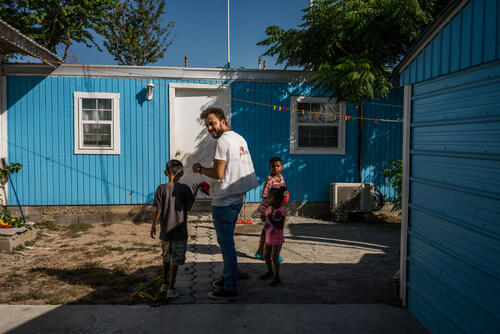
On the opposite end of the compound, another family sits on the concrete steps of Senda de Vida’s administrative building, where MSF has installed a small clinic the mobile team uses for consultations.
Ruth, Carlos, and their two young daughters arrived eight days ago from Catacamas, in Honduras’s Olancho department. They too find themselves trapped here in Reynosa after being denied asylum at the US border.
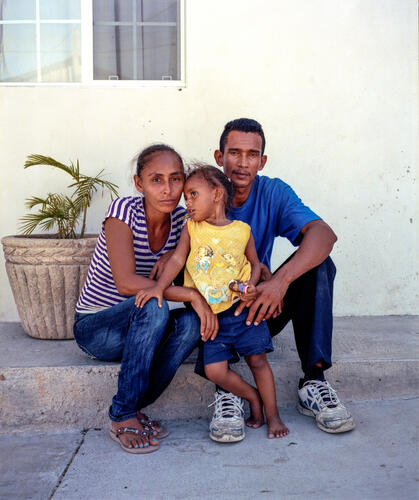
We’ve suffered so much in Mexico. We stayed in the bus station, sleeping with our kids. There were times when we didn’t have anything to eat.
“I was kidnapped in Honduras,” says Carlos. “Thank God, I escaped, but they wanted to kidnap my daughters and wife as well.” He says they did not even need to think about the decision to leave: “We were in danger.” They were aware there could be further risks along the way. “We came to Mexico by bus,” says Carlos. “We went through Guatemala, but it’s difficult to go through there, too. Getting into Mexico is even worse. There are kidnappings, rapes . . .”
“We’ve suffered so much in Mexico,” says Ruth, stroking her daughter’s hair. “We stayed in the bus station, sleeping with our kids. There were times when we didn’t have anything to eat.”
Ruth and Carlos don’t know where they will go from here, but they know it won’t be back to their home country, where the rest of their extended family still lives.
“We can’t live in Honduras,” Carlos says flatly. “I’d like us to have a home of our own, but it was necessary to leave there. They threatened my children.”
The family has a temporary permit to stay in Mexico and can be referred to legal aid through MSF’s psychosocial care programme. But their future here, stuck between a home they can’t return to and a haven closed off to them, remains desperate.
“I think the United States needs to listen to what people are going through,” says Carlos. “Narcotrafficking, kidnapping, gangs—people are dying in Honduras.” He knows that some people may be crossing the border to find work or, as he says, “just to check it out.”
But for Carlos and his family, the painful decision to leave was forced on them. “Only we know how we feel. Only we know what we’ve been through.”
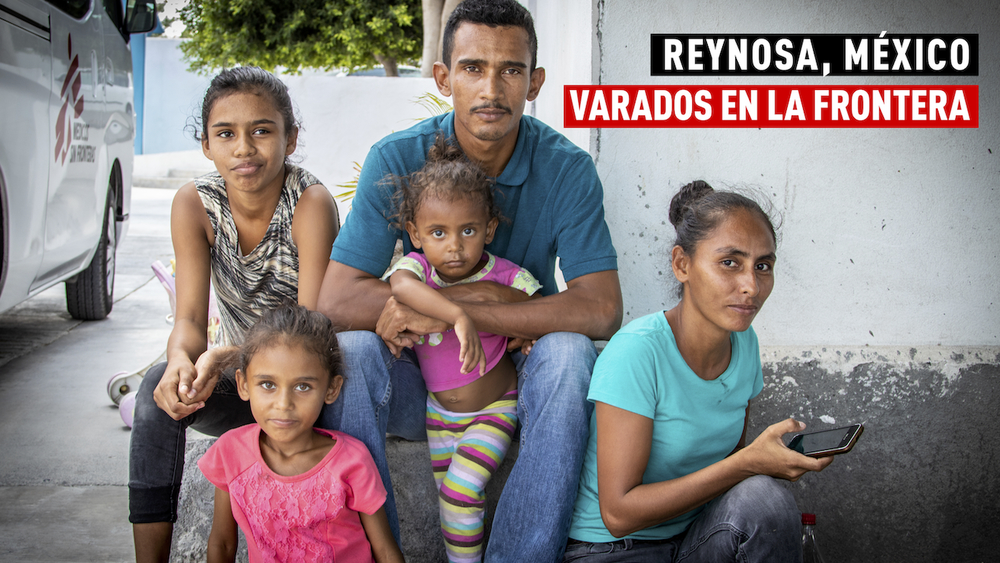
Stranded at the border
Home to more than 600,000 people, Reynosa is a common way station for many Central American migrants hoping to gain entry to the US. It’s also one of the most violent cities in Mexico.
MSF teams in Reynosa provide medical and psychological care, along with social services, to both local and migrant communities.
A team comprising a doctor, nurse, social worker, and psychologist work at a fixed clinic, while mobile teams visit two migrant shelters, Casa del Migrante Guadalupe and Senda de Vida, in addition to a shelter for minors, Centro de Atención al Menor Fronterizo (CAMEF).



